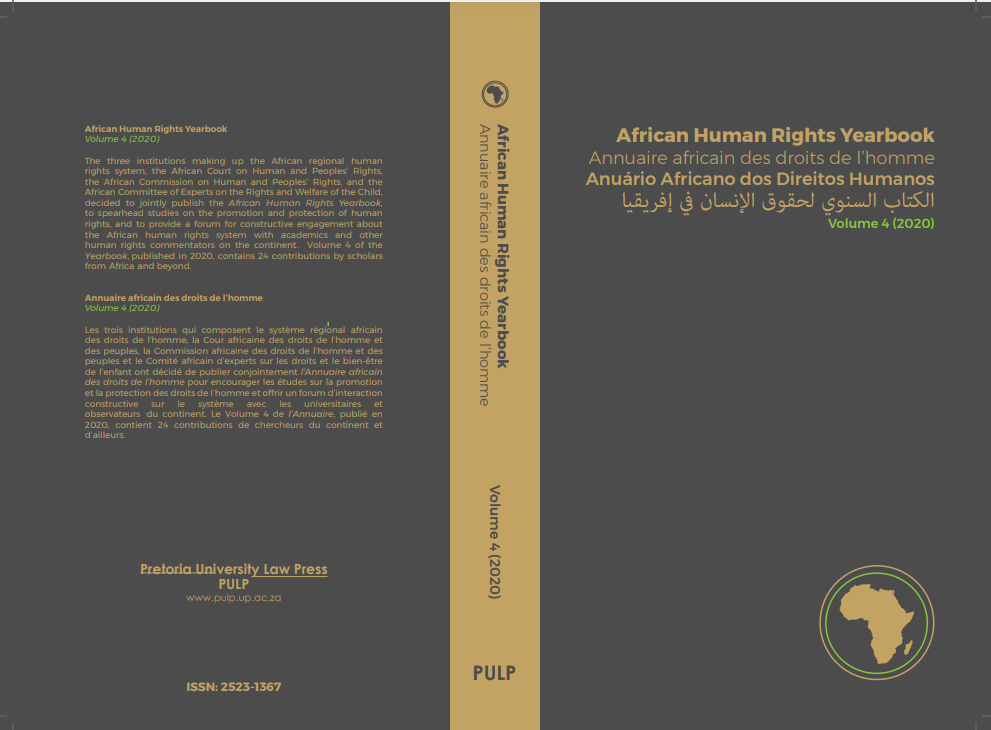أھمية تصديق مصر علي بروتوكول المحكمة اإلفريقية لحقوق االنسان و الشعوب
DOI:
https://doi.org/10.29053/2523-1367/2020/v4a9الكلمات المفتاحية:
الكلمات االساسية، المحكمة االفريقية لحقوق االنسان والشعوب، النظام القانوني المصري، التصديق على بروتوكول المحكمة االفريقية،، الميثاق األفريقيالملخص
ملخص: تعد المحكمة اإلفريقية لحقوق االنسان والشعوب الھيئة القضائية الوحيدة ذات الوالية لحماية حقوق اإلنسان في القارة ، ومن ثم فھي الذراع القضائي لالتحاد اإلفريقي، علي الرغم من أن الدول الموقعة علي بروتوكول شرم الشيخ المؤرخ في 1 يوليو 2008،ھي 30 دولة من أصل 54 ولم تصادق عليه إلي االن سوي 5 دول فقط ، األمر الذي يتطلب تضافر جھود كل الدول اإلفريقية في دعم و إنجاح المحكمة في رسالتھا. وتم دمج المحكمة االفريقية للعدل و المحكمة االفريقية لحقوق االنسان والشعوب في محكمة واحدة سميت بالمحكمة األفريقية للعدل وحقوق اإلنسان، اال ان البروتوكول المنشأ لم يدخل حيز النفاذ حتى االن. كما حاولت الدراسة تبين أوجه معالم النظام القانوني المصري من حقوق اإلنسان ، من خالل الموقف الدستوري الحالي ، والذي دل علي إعالء الدولة المصرية لقيم و مبادئ حقوق اإلنسان،وموقف مصر من التصديق علي بروتوكول المحكمة اإلفريقية. و خلصت الدراسة إلي تطبيق النظام القانوني المصري لألحكام القانونية التي وردت في صلب الميثاق االفريقي لحقوق االنسان والشعوب، بما يدلل و يقطع باحترام مصر لكافة مبادئ و قواعد القانون الدولي لحقوق اإلنسان، األمر الذي يتطلب تصديق مصر علي بروتوكول المحكمة اإلفريقية لحقوق اإلنسان والشعوب تتويجا لسياسيات و فلسفة الدولة المصرية في ھذا المجال ، كما انتھت الدراسة بمجموعة من أھم النتائج و التوصيات القانونية.
TITLE AND ABSTRACT IN ENGLISH: The relevance of Egypt ratification of the Protocol creating the African Court of Justice and Human Rights
ABSTRACT: The African Court on Human and Peoples’ Rights is the only judicial body with a mandate to protect human rights on the continent, and therefore it is the judicial arm of the African Union, despite the fact that the countries that signed the Sharm el-Sheikh Protocol of 1 July 2008, are 30 out of 54 and have not ratified it. So far, only five countries have ratified it thus suggesting the ratification requires a concerted efforts of all African countries. The African Court of Justice and the African Court of Human and Peoples’ Rights were merged into one court called the African Court of Justice and Human Rights, but the established protocol has not yet entered into force. This article clarifies aspects of the human rights features of the Egyptian legal system, through the current constitutional position, which indicated that the Egyptian state upholds the values and principles of human rights, and Egypt’s position on ratification of the African Court Protocol. The study concluded that the Egyptian legal system applies the legal provisions contained within the African Charter on Human and Peoples’ Rights, in a way that demonstrates and interrupts Egypt’s respect for all principles and rules of international human rights law, which requires Egypt's ratification of the protocol of the African Court on Human and Peoples’ Rights as a culmination of policies and philosophy of the Egyptian state in this field, as the study concluded with a set of the most important findings and legal recommendations.
TITRE ET RÉSUMÉ EN FRANCAIS: L’importance de la ratification par l’Egypte du Protocole créant la Cour africaine de justice et des droits de l’homme
RÉSUMÉ: La Cour africaine des droits de l’homme et des peuples est le seul organe judiciaire ayant pour mandat de protéger les droits de l’homme sur le continent, et par conséquent, c’est le bras judiciaire de l’Union africaine, malgré le fait que 30 sur 54 pays ont signé le Protocole de Charm el-Cheikh du 1er juillet 2008, seuls cinq pays l’ont ratifié. Ce qui nécessite les efforts concertés de tous les pays africains pour soutenir et réussir la mission de la Cour. La Cour africaine de justice et la Cour africaine des droits de l’homme et des peuples ont été fusionnées en un seul tribunal appelé Cour africaine de justice et des droits de l’homme, mais le protocole établi n’est pas encore entré en vigueur. Cette étude clarifie certaines caractéristiques du système égyptien des droits de l’homme à travers la position constitutionnelle actuelle, qui indique que l’État égyptien défend les valeurs et les principes des droits de l’homme, et la position de l’Égypte à propos de la ratification du Protocole de la Cour africaine de justice. L’étude a conclu que le système juridique égyptien applique les dispositions juridiques contenues dans la Charte africaine des droits de l'homme et des peuples, d'une manière qui démontre et affirme le respect par l’Égypte de tous les principes et règles du droit international des droits de l’homme, ce qui exige la ratification par l’Égypte du protocole de la Cour africaine de justice comme point culminant des politiques et de la philosophie de l’État égyptien dans ce domaine. L’étude aboutit à l’ensemble des conclusions et recommandations juridiques les plus importantes.


